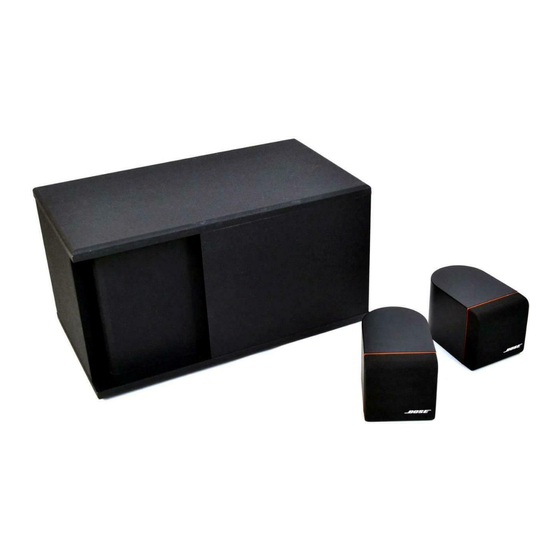Bose Acoustimass 3 Series Manual - Página 11
Navegue en línea o descargue pdf Manual para Sistema estéreo Bose Acoustimass 3 Series. Bose Acoustimass 3 Series 43 páginas. Powered speaker system
También para Bose Acoustimass 3 Series: Manual del usuario (17 páginas), Manual del usuario (10 páginas), Manual de servicio (42 páginas)

10. Power Amp (Amplifier PCB)
Four identical topology class B, power amplifier stages are used to create the three power
amplifier channels. One each is used for the left and right power amplifiers (2 x 20W into 4 Ohm),
and two are used in bridged mode for the bass channel to create 50W into 5 Ohm. Operation
of the left channel (representative) is as follows:
A positive signal at op-amp input U106 pin 3 causes op-amp supply current to flow into pin 7
(and out through pin 6) through Q103. Q103 is used simply to buffer the +20V high voltage
supply down to a safe +7.4V for the op-amp. This current also flows through R132 and diode
D105. R132 and D105, together with driver transistor Q105 and R134 form a current mirror
which multiplies the current through Q103 by the ratio R132/R134. This increased current flows
through driver transistor Q105, and into the base of output transistor Q107. The hFE current
gain of output transistor Q107 (about 100) provides final current amplification before reaching
the speaker output.
The power amplifier topology is complementary. Therefore, operation of the amplifier on
negative half cycles is identical to positive cycle operation, except for component reference
designations.
11. Short-Circuit Protection
Left and right power amp stages have short circuit protection. This is necessary to prevent
damage to the amplifier from customer misuse that might occur, for instance, if the customer
were to accidentally short the speaker cable wires that connect to the cube speakers. If this
happens, all three amplifiers will momentarily mute for about 3-4 seconds and continue to mute
until the abnormal condition is removed.
Ω
Short circuit protection is achieved with the use of a .1
resistor (R146 for left channel) in series
with each amplifier output. Under normal conditions, peak current to the 8 Ω speakers should
never exceed 3.5A. If current flow momentarily exceeds 5.0A, then Q109 will conduct and
trigger monostable multivibrator circuit U5 (pins 5, 6, 7) on the Main PCB. Pin 7 will go high
(for about 3 seconds) and through diode D12 will trigger mute transistor Q10. Turn-on of Q10
causes all three amplifiers to mute. Referring to the left channel power amplifier, actual muting
occurs by turning on transistors Q110, Q101, and Q102 which cause both driver transistors
Q105 and Q106 to turn off. When the driver transistors are off, there can be no current flow
through the output transistors, which results in no current flow to the speaker.
11
